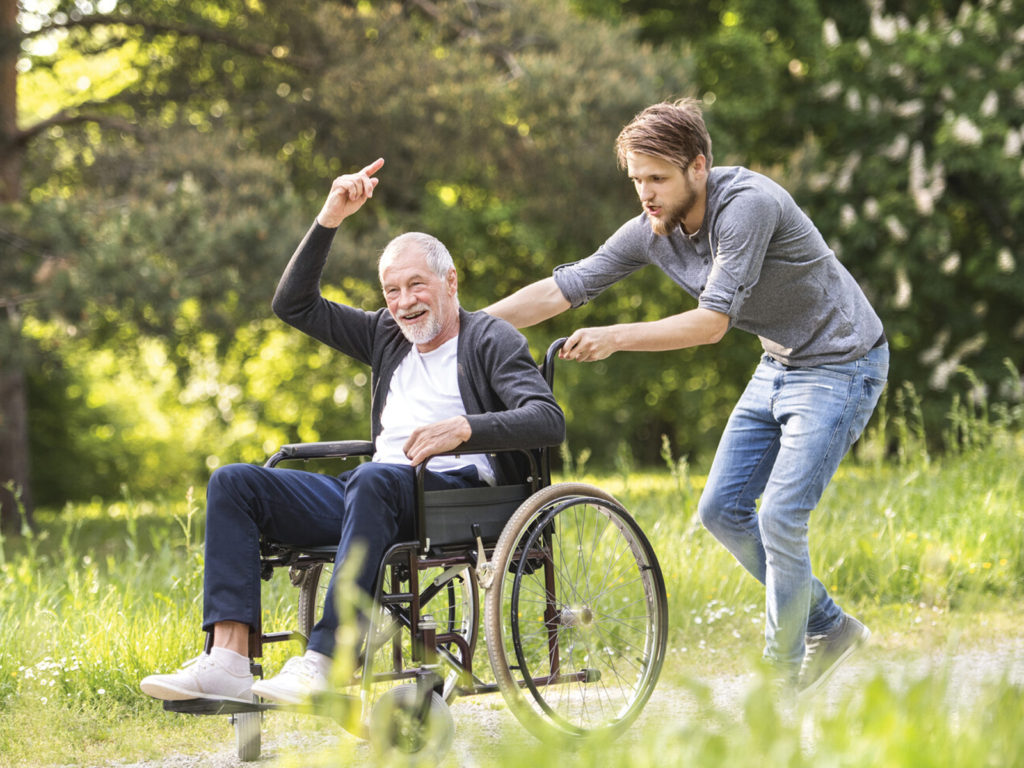Is it harder to care for an aging loved one with a declining physical or mental health condition? Both situations can be undeniably challenging.
When my father started repeating questions and stories, I didn’t give this much thought as Dad had always been a bit absent-minded but as the problem persisted, my sister and I became concerned. Eventually, after many months, and additional loss of memory and ability to function on his own, he was diagnosed with Alzheimer’s disease.
In time, Dad could not remember what day of the week it was, where he lived, or recognize me, his only son and primary caregiver. With no cure for Alzheimer’s disease, there was no stopping what was happening to Dad. My sisters and I did try medication meant to slow down the progression of the disease but we didn’t see any improvement. I could only watch helplessly and keep Dad as comfortable, and safe, as possible.
Losing Dad this way was likely the hardest thing I have ever faced in life. While he certainly looked familiar, he rapidly became a shell of who he was once was and was unable to perform even the simplest tasks, make decisions, and/or take care of himself. He became completely dependent on us.
If you find yourself in a similar situation try to establish a daily routine with flexibility built in. Some tasks are better when the person is alert and refreshed at the beginning of the day. Allow time for breaks. Here are some of the other things that worked for me:
Stay calm
Take your time. Tasks will take longer. Instead of getting frustrated or angry with Dad, I learned to calmly respond when asked the same thing over and over. I simply answered again as if I had never heard his question or story before.
When I leaned in to hear Dad “remembering” going on a family holiday which never occurred, mistakenly identifying the family caregiver as an old friend, or watching the boats come into dock outside his long-term care room window, the conversation was far more enjoyable! Also providing simple instructions that are clear and involve one step at
a time often makes for better understanding.
Provide choices
Don’t forget the individual your loved one was and still is. Involve them as much as possible in the options. Minimize distractions when you’re communicating and talk slowly and clearly. Depending on the situation, you might be able to offer the person with dementia a choice: For example would they like a warm or cold beverage, which of two outfits would they like to pick (have them laid out) or, would they rather listen to music or take a walk. Hint: if they really like one outfit buy two or three that are the same rather than trying to do battle over clothing changes.

Promote physical health
Many scientific studies have found a direct connection between physical and mental health. When a senior’s memory starts to fail, his/her physical condition can also slide. During visits to my father’s long-term care home, other residents slumped in their wheelchairs and parked in corners alone were quite conspicuous.
I chose to walk with Dad … this was something he always had enjoyed and could keep up a brisk pace. Others could also benefit from practicing supervised chair yoga, swimming, dancing, gentle stretching, and/or lifting light weights.
Use physical touch
Family caregivers can still connect with a senior with Alzheimer’s disease (or another dementia) through touch. Dad could only speak in incoherent mumbles, but judging by his approving grunts, I found that he enjoyed a good hug from me. Physical touch can also be a good trick to help get attention. Standing directly in front of the person when speaking, talking slowly, and limiting sentences to one thought can also be effective.
Remember respite
It’s common advice that is commonly (and unfortunately) dismissed—caregivers must look after themselves. Family caregivers focusing their time, energy, and resources on helping a loved one may find they cannot sustain doing so over the long term. With proper self-care, a family caregiver can relax and recharge, lessen personal stress, and become a better—and more effective—caregiver. With our warmer weather now, take time for yourself… plant a garden in your backyard, relax in a patio chair and read a book outside, or ride your bicycle.
Reduce work hours
Family caregivers may find there are not enough hours in a day to complete everything that needs to be done. Sometimes holding down a full-time job and caregiving which is often the equivalent of a second full-time job don’t mix well.
Sometimes a frank discussion with a manager or a meeting with Human Resources Manager to propose temporarily working from home, flex time opportunities, job sharing, and/or even paid leave due to your caregiving demands relives the stress of juggling caregiving and working. These day’s employers are much more open to being flexible than they were in the past. You may be pleasantly surprised!
Safety first
As dementia impairs judgement, it’s best to think ahead and take measures to prevent slips and falls by removing extension cords, scatter rugs and extension cords. Use locks on cabinets and alcohol, cleaning materials and dangerous utensils and tools. Lower the water temperature at the source to prevent burns and keep matches, lighters etc out of reach.
Each person’s journey with dementia is different and symptoms and progression may be different. Family caregivers can struggle with managing newfound responsibilities, balancing caregiving with a career, and facing the losses that may come with aging. However, take it from me, trying to stay patient and flexible along the way and asking for the supports and help you need will make your caregiving role as meaningful and rewarding as possible.
Rick Lauber is a freelance writer. He has written two books, Caregiver’s Guide for Canadians and The Successful Caregiver’s Guide.
According to the Alzheimer’s Society of Canada
597,000 Canadians live with dementia.
61.8% who live with it are women.
$359M cost to bring a drug from lab to market.
87% of carers wish others understood their reality.












